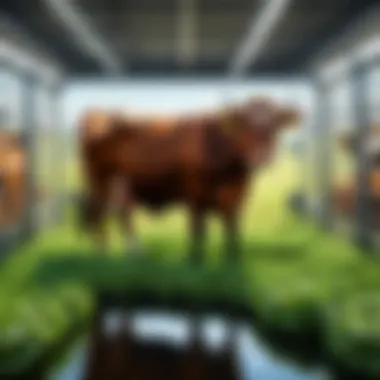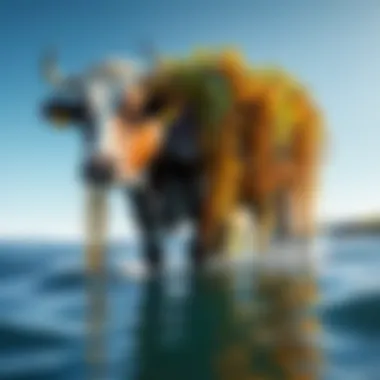Unlocking the Advantages of Kelp Feeding for Cattle: A Comprehensive Analysis


Technology Insights
Feeding kelp to cattle is a practice that is gaining attention in the agricultural sector. The incorporation of nutrient-rich kelp into cattle feed presents promising benefits for livestock health and environmental sustainability. This innovative approach aims to revolutionize traditional cattle feeding methods by enhancing nutritional content and reducing the environmental footprint of livestock farming.
The use of kelp in cattle diets offers a natural source of essential minerals, vitamins, and antioxidants, which can promote overall animal well-being and productivity. By supplementing traditional feed with kelp, farmers can potentially improve the immune system of cattle, enhance digestion, and support optimal growth and development.
Additionally, the sustainable cultivation of kelp for cattle feed holds the potential to reduce greenhouse gas emissions and promote eco-friendly farming practices. Kelp cultivation is known for its ability to sequester carbon dioxide from the atmosphere and mitigate the impacts of climate change. By utilizing kelp as a feed supplement, farmers can contribute to environmental conservation efforts while enhancing the nutritional quality of livestock feed.
Moreover, incorporating kelp into cattle feed can lead to a reduction in the reliance on synthetic supplements and chemical additives, aligning with the growing consumer demand for natural and organic agricultural products. This shift towards sustainable and natural feed ingredients reflects a broader trend in the agricultural industry towards more ecologically conscious practices that prioritize animal welfare, environmental stewardship, and consumer health.
Introduction to Feeding Kelp to Cattle
Feeding kelp to cattle is a topic of growing interest. It involves incorporating nutrient-rich kelp into the feed of cattle to enhance their health and well-being, as well as to improve environmental sustainability in the livestock industry. This practice presents a unique opportunity to optimize cattle nutrition while minimizing negative environmental impacts.
Historical Perspective
Traditional Feeding Practices
Traditional feeding practices have long been a cornerstone of cattle management. Historically, farmers relied on locally available fodders and supplements to meet the nutritional needs of their livestock. Through generations, these practices evolved to prioritize the health and productivity of cattle. The tradition of providing natural, wholesome feed has been integral to sustaining cattle populations. However, the limitations of traditional feeds in meeting modern nutritional standards have paved the way for innovative approaches like kelp supplementation.
Evolution of Kelp Utilization
The evolution of kelp utilization marks a significant shift in cattle feeding practices. As awareness of the nutritional benefits of kelp grew, so did its adoption in livestock diets. The transition from conventional feeds to kelp supplementation signifies a departure from traditional methods towards more sustainable and nutritionally rich alternatives. The unique composition of kelp as a feed source has propelled its utilization in modern cattle farming, offering a broader spectrum of nutrients essential for cattle health and growth.
Modern Adoption
Current Trends
Current trends in cattle feeding indicate a gradual shift towards integrating kelp into livestock diets. With a focus on enhancing nutritional quality and promoting sustainability, kelp has emerged as a prominent feed supplement choice among cattle farmers. The increasing awareness of the benefits associated with kelp consumption has spurred this trend, leading to its widespread adoption across various cattle farming operations.


Research and Studies
Research and studies have played a crucial role in validating the benefits of kelp for cattle. Scientific investigations have highlighted the positive impact of kelp supplementation on cattle health and performance. Through rigorous experimentation and analysis, researchers have demonstrated the efficacy of kelp in improving digestive health and immune function in cattle. The insights gained from these studies have considerably influenced the modern adoption of kelp in cattle feeding practices.
Nutritional Value of Kelp for Cattle
In this article, we delve into the essential topic of the nutritional value of kelp for cattle, focusing on the immense benefits it offers to both the livestock industry and the surrounding environment. By exploring the unique elements, advantages, and considerations regarding the nutritional value of kelp for cattle, readers will gain valuable insights into this innovative and sustainable feeding practice.
Essential Nutrients
Vitamins and Minerals
The discussion on the importance of vitamins and minerals in kelp unveils their significant contributions to the overall health and well-being of cattle. These essential nutrients are crucial for maintaining optimal bodily functions and metabolic processes within the livestock. The richness of vitamins and minerals in kelp makes it a preferred choice for enhancing the nutritional profile of cattle feed. The unique feature of vitamins and minerals in kelp lies in their natural and bioavailable forms, ensuring maximum absorption by the cattle. This aspect proves advantageous as it promotes efficient nutrient utilization, benefiting the overall health and productivity of the cattle.
Protein Content
The protein content in kelp plays a vital role in fulfilling the dietary requirements of cattle, contributing to their growth and development. Highlighting the significant protein content in kelp showcases its suitability for meeting the essential amino acid needs of the livestock. The key characteristic of protein content in kelp lies in its high-quality and easily digestible nature, making it a popular choice for inclusion in cattle feed. The unique feature of protein content in kelp is its balanced amino acid profile, which supports various physiological functions in cattle without compromising on digestibility. This aspect brings forth the advantages of enhanced muscle development and overall health maintenance for the cattle.
Benefits for Cattle Health
Digestive Health
Delving into the aspect of digestive health, we uncover the pivotal role kelp plays in promoting optimal digestive functions in cattle. The key characteristic of digestive health enhancement through kelp consumption lies in its ability to regulate gut health and improve nutrient absorption. This beneficial aspect makes digestive health a popular choice for inclusion in cattle feed, ensuring overall gastrointestinal well-being. The unique feature of digestive health support from kelp lies in its natural prebiotic content, which fosters a healthy gut microbiota and aids in efficient digestion. These advantages ultimately contribute to improved nutrient utilization and digestive efficiency in cattle.
Immune System Support
Exploring the realm of immune system support, we recognize the profound impact kelp has on bolstering the immune defenses of cattle. The key characteristic of immune system support by kelp stems from its rich source of antioxidants and bioactive compounds, which play a significant role in enhancing immunity. This beneficial aspect positions immune system support as a valuable addition to cattle feed, ensuring robust defense mechanisms against various pathogens and diseases. The unique feature of immune system support from kelp is its innate ability to stimulate immune response pathways and fortify the overall health resilience of the livestock. These advantages contribute to a strengthened immune system and heightened disease resistance in cattle.
Environmental Impact and Sustainability
Feeding kelp to cattle carries immense significance in terms of environmental impact and sustainability within the livestock industry. By incorporating kelp into cattle feed, there is a potential reduction in methane emissions, one of the primary contributors to greenhouse gases. This practice aligns with the growing awareness of sustainable agriculture and environmentally friendly farming methods. Additionally, feeding kelp to cattle can lead to improved soil health due to its nutrient-rich composition, fostering sustainable land management practices. The utilization of kelp contributes to promoting a healthier ecosystem by reducing the carbon footprint associated with traditional feed production methods.


Reducing Methane Emissions
Impact on Greenhouse Gas:
The inclusion of kelp in cattle diets can play a crucial role in reducing methane emissions. Kelp contains compounds that may help mitigate the methane produced during digestion in cattle, thereby reducing the overall greenhouse gas emissions associated with livestock farming. This aspect is vital in addressing climate change concerns and promoting sustainable agricultural practices. The ability of kelp to aid in lessening methane output showcases its promise as a environmentally beneficial feed additive in cattle diets.
Sustainable Practices:
Adopting sustainable practices such as integrating kelp into cattle feed aligns with the broader goal of creating a more environmentally friendly livestock industry. By sourcing kelp from responsibly managed farms or harvested wild stocks, farmers can contribute to ocean conservation efforts while enhancing the nutritional value of cattle feed. Such practices not only support ecosystem health but also promote sustainable resource management, making kelp a sustainable choice for enhancing cattle nutrition and reducing environmental impact.
Ocean Conservation
Harvesting Practices:
The harvesting of kelp for cattle feed production follows strict guidelines to ensure minimal impact on marine ecosystems. By using sustainable kelp harvesting practices, such as selective harvesting and adherence to quotas, the negative repercussions on ocean biodiversity are minimized. Responsible harvesting of kelp plays a crucial role in maintaining marine ecosystem balance and preserving coastal habitats. Implementing ethical harvesting methods can help safeguard ocean health while meeting the increasing demand for kelp as an alternative feed supplement for cattle.
Ecosystem Benefits:
Feeding kelp to cattle not only benefits livestock nutrition but also contributes to ecosystem health. By utilizing kelp sourced from sustainable harvesting practices, farmers support marine biodiversity and promote ocean conservation. The byproducts of kelp farming, such as reducing the reliance on land-based feed crops, can lead to a more balanced ecosystem. Incorporating kelp into the livestock industry demonstrates a holistic approach to sustainable agriculture, where environmental considerations are integrated into livestock management practices.
Implementation in the Livestock Industry
In the realm of livestock management, the implementation of feeding kelp to cattle plays a pivotal role in revolutionizing traditional practices. By incorporating kelp into cattle diets, various benefits can be witnessed, ranging from enhanced animal health to reduced environmental impact. The significance of implementing kelp in the livestock industry cannot be overstated, as it signifies a shift towards more sustainable and nutritionally enriching feeding practices.
Challenges and Solutions
Feeding Regulations
Feeding regulations pertaining to the integration of kelp in cattle diets are crucial for ensuring compliance with industry standards and animal welfare. These regulations dictate the permissible levels of kelp inclusion, quality standards, and provide guidelines for monitoring animal health. Compliance with feeding regulations not only safeguards animal well-being but also promotes responsible farming practices, enhancing the overall reputation of the livestock industry.


Integration into Diet Plans
The integration of kelp into existing cattle diet plans poses both challenges and opportunities. One key characteristic of integrating kelp is the need for meticulous formulation adjustments to ensure a balanced nutritional profile for the livestock. While these adjustments may require initial investments in diet planning and monitoring, the benefits of improved animal health and productivity outweigh the challenges. The unique feature of integrating kelp lies in its potential to enhance feed efficiency and quality, offering a sustainable solution for livestock nourishment.
Economic Viability
Cost Analysis
Conducting a comprehensive cost analysis of incorporating kelp into cattle feed is essential for evaluating the financial implications of this feeding practice. The cost analysis encompasses factors such as procurement expenses, formulation costs, and labor expenditures associated with diet modification. Understanding the financial impact of kelp integration allows farmers and stakeholders to make informed decisions regarding resource allocation and budgeting. While initial costs may seem daunting, long-term benefits in terms of improved cattle health and production can offset these expenses.
Profitability Factors
Exploring the profitability factors related to feeding kelp to cattle involves assessing the potential returns on investment and economic gains. One key characteristic of profitability lies in the enhanced nutritional value that kelp provides, potentially leading to improved cattle performance and product quality. The unique feature of profitability factors associated with kelp feeding is their capacity to create competitive advantages for livestock producers, positioning them favorably in the market. By analyzing these factors, stakeholders can optimize their operations and maximize profitability in the evolving landscape of the livestock industry.
Future Prospects and Research Directions
Future prospects and research directions play a vital role in enhancing the innovative practices of feeding kelp to cattle. By delving into the advancements in cattle feeding methodologies, we pave the way for sustainable solutions in the livestock industry. It is essential to highlight how research in this area propels us towards improved animal health and environmental sustainability. By focusing on future prospects and research directions, we can unlock potential benefits that may revolutionize the way we feed cattle.
Innovations in Cattle Feeding
Technology Advancements
Technology advancements are at the forefront of transforming cattle feeding practices. The integration of cutting-edge technologies in feed production and monitoring systems revolutionizes how farmers optimize nutrition for their livestock. One key characteristic of technology advancements is their precision in delivering customized nutritional plans for cattle, ensuring optimal health and productivity. The unique feature of technology advancements lies in their ability to enhance feed efficiency and reduce waste, contributing to overall sustainability in cattle farming. While technology advancements offer numerous advantages such as real-time monitoring and data-driven decision-making, challenges may arise in initial implementation costs and maintenance requirements.
Cross-sector Collaborations
Cross-sector collaborations mark a significant shift towards a holistic approach to cattle feeding practices. By fostering partnerships between different industries, such as agriculture, technology, and environmental science, innovative solutions are developed to address complex challenges in livestock management. The key characteristic of cross-sector collaborations is the synergistic exchange of knowledge and resources to drive sustainable practices in cattle feeding. These collaborations are a popular choice for their interdisciplinary nature, ensuring comprehensive solutions that consider various aspects of cattle health and environmental impact. The unique feature of cross-sector collaborations lies in their ability to bridge gaps between different domains, leading to integrated approaches that benefit both the livestock industry and the environment. While advantages include shared expertise and diversified perspectives, challenges may involve coordinating diverse stakeholders and aligning goals effectively.
Unexplored Areas
Long-Term Studies
Long-term studies serve as foundational pillars in expanding our understanding of feeding kelp to cattle. By conducting in-depth research over extended periods, we can gather valuable insights into the long-term effects of kelp supplementation on cattle health and performance. The key characteristic of long-term studies is their ability to provide evidence-based data that is essential for making informed decisions regarding cattle nutrition. The unique feature of long-term studies lies in their contribution to establishing concrete guidelines and best practices for incorporating kelp into cattle diets. While advantages include comprehensive data collection and trend analysis, challenges may involve resource-intensive nature and time requirements.
Unconventional Applications
Exploring unconventional applications of feeding kelp to cattle offers a realm of possibilities for innovative practices. By venturing into uncharted territories, we may discover alternative uses and benefits of kelp beyond traditional feeding methods. The key characteristic of unconventional applications is their potential to uncover novel ways of enhancing cattle health and sustainable farming practices. The unique feature of unconventional applications lies in their disruptive nature, challenging existing norms and sparking creativity in cattle feeding approaches. While advantages include diversification of feed sources and potential for novel discoveries, challenges may arise in adapting unconventional applications to mainstream practices and validating their efficacy.







